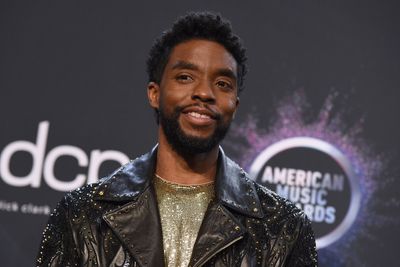Grieving Chadwick Boseman and Imagining Black Futures
The Black community is grieving the death of Chadwick Boseman together.
On August 28, the death of Chadwick Boseman was announced, and the news carried with it a particular kind of sadness.
We saw him in 21 Bridges and Da 5 Bloods. He played Jackie Robinson in 42 and James Brown in Get on Up. We learned to associate him with greatness, even before Black Panther, but the Marvel movie put him over the top. No one else could have played T'Challa. No one else could have brought that energy. Boseman is the one we called king. Now he has gone to be with the ancestors, and those of us still here are mourning this earthly loss.
Boseman was more than an actor. He didn't just play a role in a movie. He became a symbol of the Black future we, now, not only imagine, but remember from our visit to the world of Wakanda through Black Panther. He made it possible. Since his death, many accounts have emerged detailing his deep involvement in the production of the film and the changes he encouraged to ensure the experience was authentically us.
Celebrity deaths and the grief surrounding them can feel strange. We wonder how it is possible to feel the loss of complete strangers so deeply that we need to cry, to vent, to revisit their work, and to stay up late to talk about the impact they had on our lives, if only through their work.
Sometimes, our grief goes even deeper. This time around, our experience of grief has been difficult, but also healing. When we grieve as a community, we focus on the feelings and experiences we share, and through this, and see each other's humanity.
Boseman's death came as a shock, partly because we had no idea he was battling colon cancer. Many people were amazed by the loyalty of his circle, who never leaked this information.
The news about his death also sparked a conversation about capitalism, ableism, and illness. On social media, people questioned Boseman's decision to keep working, even as he received treatment and underwent surgeries. Was it because he did not want to be pitied? Did not want to lose roles? Did he think decision-makers wouldn't consider him, whether or not for (what they considered) noble reasons? Did he want to ensure his family was financially secure when he could no longer work? Did he feel fine?
We are not likely to get answers to these questions. We don't need them. That they were raised at all speaks to our increasing awareness of the intersections of identity and the way existing systems often force us into uncomfortable positions. There is, far too often, no right decision for someone in the situation Boseman was in. Some of us have more privilege and more viable options than others, but many of us are stuck. This is why we have to push back against the idea that we can "sleep when we're dead," and we have to push back anytime people attempt to cite Boseman's impeccable work during illness in order to justify capitalist ideals. Some people have written things like, "Boseman did Black Panther while battling cancer. You have no excuse," and it's gross. Some call these kinds of comments "inspiration p-rn." Many identify them as ableism.
This kind of rhetoric is not new. We saw the come-out-of-the-pandemic-with-a-new-business memes everywhere in the early days of COVID-19. The response to them was similar, because this capitalist rhetoric, seeing people's value as synonymous with their productivity, is antithetical to the Black futures we are building. It is harmful, insulting, and incorrect.
We do not exist to work. Our value is not determined by our productivity. T'Challa would have stood against that idea.
Black futures cannot be built on capitalism. Black futures cannot glorify work through illness. Black futures have to celebrate and encourage rest. Black futures have to center community. In a world where community is prioritized over capitalism, no one would have to work through illness. No one would have to be ashamed of illness. No one would have to prove themselves deserving of love, care, or memory through work.
All Black Lives Matter, at all times, in all places, separate and apart from what we produce. That is what Black Panther is about—us deserving a place where we can live together, sharing joy, enjoying peace, and being unapologetically ourselves.
I see Boseman's decision to keep working as evidence of his love for the craft and a commitment to bring Wakanda to us and show us that; while we can make the same choices, we don't have to. We can choose different paths. Work is not everything, and Boseman left us with everything he could to remind us that we can be free. We now have a glimpse into what we could have, what we will have, and what we must create.
Imagination is critical, and sometimes grief is a portal to it. In response to this tragedy, the Black community has, yet again, declared this an abominable year and come together to share our thoughts and feelings. Boseman's death has given us a moment of pause, allowing us to grieve his loss along with other tragedies and injustices we have been facing.
In the midst of the Black Lives Matter protests continuing across the U.S., the crises arising from the COVID-19 pandemic that disproportionately affect Black people, the panic about schools reopening under these circumstances, and the upcoming presidential election, we need time. We need quiet. We need community. We need care. We need to be able to cry, to remember we are not alone, and to remember that we have the power to not only imagine Black futures, but to share those visions with one another. May Chadwick Boseman's transition from this world help to activate a portal to deeper, brighter imagination.
